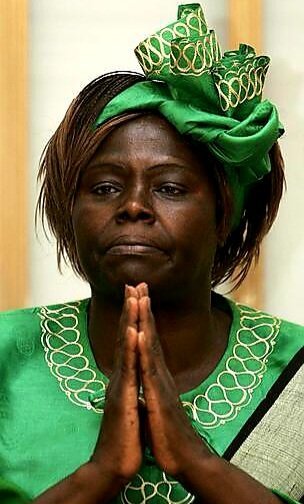#Wangari Maathai
Text

Wangari Maathai by Katherine Krizek
“Every person who has ever achieved anything has been knocked down many times. But all of them picked themselves up and kept going, and that is what I have always tried to do.”
The holistic approach to sustainable development that Wangari Maathai, founder of the Green Belt Movement, embodies embraces human rights and women’s right in particular. Her tree planting campaign empowered more than 300,000 women to plant more than 51 million trees, generating income for the rural women participants and promoting environmental consciousness in her native Kenya.
An accomplished scholar and a tireless political and environmental activist she was the first African woman to receive a Nobel prize.
Born 1940, Kenya
#wangari maathai#Katherine krizek#environmentalists#women’s rights#women’s art#female artists#women artists#ecofeminism#art#artwork#portrait#activists#female portrait#African women#irl women/girls
70 notes
·
View notes
Text

18 notes
·
View notes
Quote
Initially, the band of women was left alone because no one at the state level took their organization seriously. Once 6,000 tree nurseries were created, though, the government realized the power of their mobilization and began to harass them.
Over time, what was revealed was the intersectionality between women’s liberation and climate change. The movement that started as a tree-planting campaign ended up inspiring women to stand up for themselves and their work, freeing them from domineering husbands, village chiefs, and an unequal country mindset.
Lindsey Jean Schueman at One Earth. Climate Hero: Wangari Maathai
1991 Goldman Prize winner Wangari Maathai
46 notes
·
View notes
Text
youtube
Prof. Wangari Maathai at 80: Tree planter, Nobel Prize laureate, revolutionary
Ecosia
Mar 31, 2020
Ecosia is the search engine that plants trees. Get on Ecosia and be climate active every day: https://www.ecosia.org/
Wangari Maathai would have been in her 80s today. She was the first African woman to win the Nobel Prize, and the first Eastern African woman to receive a PhD. Maathai died in 2011, but her legacy is very much alive – thanks, in part, to your Ecosia searches. Wangari Maathai won the Nobel Peace Prize for her political activism, and for founding the Green Belt Movement, Ecosia's reforestation partner in Kenya.
Your searches are planting trees according to Prof. Maathai’s method. They are mostly planted around critical water sources, preventing erosion, and increasing both the quantity and the quality of the water.
For Wangari Maathai, however, planting trees was never just about restoring the water cycle. It was also about helping people – including the most marginalized – stand up for their human and environmental rights. Share this video to celebrate Wangari Maathai’s 80th birthday!
5 notes
·
View notes
Video
youtube
[VIRAGO] Écoféminisme : Vertes de rage ? Qui sont vraiment les écofémini...
#Video#History#Virago#Ecofeminism#French Language#Françoise d'Eaubonne#Rachel Carson#Wangari Maathai#Vandana Shiva#Chipko movement
1 note
·
View note
Photo
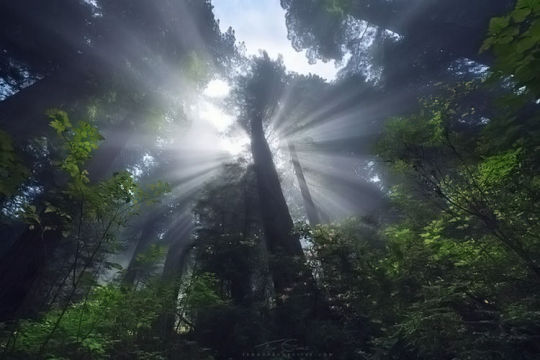
”It’s a hard thing, achieving perspective — hard for the human animal, pinned as we each are to the dust-mote of spacetime we’ve been allotted, not one of us having chosen where or when to be born, not one of us — not even the most fortunate — destined to live for more than a blink of evolutionary time. It is no wonder, then, that our lens so easily contracts to a pinhole through which the fleeting frights and urgencies of the present stream in to fill the chamber of our complex consciousness with blinding totality.
Taking the telescopic perspective helps. Trees, especially, help — for they remedy our loss of perspective as Earth’s own telescopes of time and mortality, each of them a perpetual death and yet potentially immortal, each a clockwork portal to the past, each “a little bit of the future.”
-Wangari Maathai-
“As you scale down these nested finitudes, the question becomes a powerful sieve for priorities — because undergirding it is really the question of what, from among the myriad doable things, you would choose not to do in order to fill the scant allotment of time, be it the 8,760 hours of a year or a single hour, with the experiences that confer upon it maximum aliveness, that radiant vitality filling the basic biological struggle for survival with something more numinous.”
-The Marginalian -

15 notes
·
View notes
Text
#what's her name#podcast#wangari maathai#feminism#feminist#environmentalism#africa#colonialism#history#Spotify
2 notes
·
View notes
Text
DR. WANGARI MAATHAI // ACTIVIST
“She was a Kenyan social, environmental and a political activist and the first African woman to win the Nobel Peace Prize. As a beneficiary of the Kennedy Airlift, she studied in the US, earning a bachelor’s degree from Mount St. Scholastica and a master’s degree from the University of Pittsburgh. She went on to become the first woman in East and Central Africa to become a Doctor in Philosophy, receiving her PhD from the University of Nairobi in Kenya. In 1977, she founded the Green Belt Movement, an environmental non-governmental organisation focused on the planting of trees, environmental conservation and women’s rights.”


0 notes
Text
TOTTENHAM TREES POETRY READING AT THE ROOM

View On WordPress
0 notes
Text
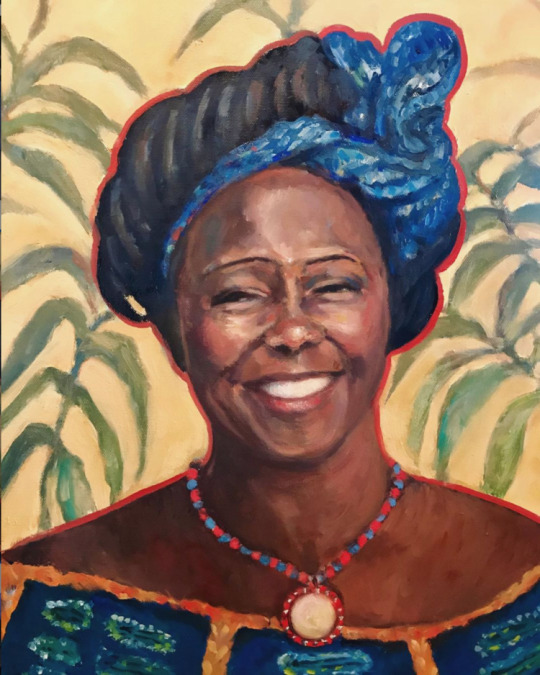
Wangari Maathai by Allison Adams
“We owe it to ourselves and to the next generation to conserve the environment so that we can bequeath our children a sustainable world that benefits all.”
Wangari Maathai (1940— 2011) was a Kenyan politician and environmental activist who was awarded the 2004 Nobel Prize for Peace, becoming the first black African woman to win a Nobel Prize. Her work was often considered both unwelcome and subversive in her own country, where her outspokenness constituted stepping far outside traditional gender roles. While working with the National Council of Women of Kenya, Maathai developed the idea that village women could improve the environment by planting trees to provide a fuel source and to slow the processes of deforestation and desertification.The Green Belt Movement, an organization she founded in 1977, has now planted some 51 million trees in Kenya and has inspired neighboring African countries to do the same.
#Wangari Maathai#Allison adams#art#artwork#female portrait#environmental activists#environmentalists#activism#female artist#women artists#african women#irl women/girls
0 notes
Quote
When we plant trees, we plant the seeds of peace and seeds of hope. We also secure the future for our children.
Wangari Maathai in The Green Belt Movement: Sharing the Approach and the Experience
The LInk at The Green Bealt Movement Website has a table with links to the site. The link to Key Speeches & Articles is a great resource.
32 notes
·
View notes
Text
"In January 1992, it came to the attention of Maathai and other pro-democracy activists that a list of people were targeted for assassination and that a government-sponsored coup was possible. Maathai's name was on the list. The pro-democracy group, known as the Forum for the Restoration of Democracy (FORD), presented its information to the media, calling for a general election. Later that day, Maathai received a warning that one of their members had been arrested. Maathai decided to barricade herself in her home. Shortly thereafter, police arrived and surrounded the house. She was besieged for three days before police cut through the bars she had installed on her windows, came in, and arrested her. She and the other pro-democracy activists who had been arrested were charged with spreading malicious rumors, sedition, and treason. After a day and a half in jail, they were brought to a hearing and released on bail. A variety of international organisations and eight senators (including Al Gore and Edward M. Kennedy) put pressure on the Kenyan government to substantiate the charges against the pro-democracy activists or risk damaging relations with the United States. In November 1992, the Kenyan government dropped the charges.
On 28 February 1992, while released on bail, Maathai and others took part in a hunger strike in a corner of Uhuru Park, which they labeled Freedom Corner, to pressure the government to release political prisoners. After four days of hunger strike, on 3 March 1992, the police forcibly removed the protesters. Maathai and three others were knocked unconscious by police and hospitalized. President Daniel arap Moi called her "a mad woman" and "a threat to the order and security of the country". The attack drew international criticism. The US State Department said it was "deeply concerned" by the violence and by the forcible removal of the hunger strikers. When the prisoners were not released, the protesters – mostly mothers of those in prison – moved their protest to All Saints Cathedral, the seat of the Anglican Archbishop in Kenya, across from Uhuru Park. The protest there continued, with Maathai contributing frequently, until early 1993 when the prisoners were finally released.
During this time, Maathai was recognized with various awards internationally, but the Kenyan government did not appreciate her work. In 1991 she received the Goldman Environmental Prize in San Francisco and the Hunger Project's Africa Prize for Leadership in London. CNN aired a three-minute segment about the Goldman prize, but when it aired in Kenya, that segment was cut out. In June 1992, during the long protest at Uhuru Park, both Maathai and President arap Moi travelled to Rio de Janeiro for the UN Conference on Environment and Development (Earth Summit). The Kenyan government accused Maathai of inciting women and encouraging them to strip at Freedom Corner, urging that she not be allowed to speak at the summit. Despite this, Maathai was chosen to be a chief spokesperson at the summit."
#Wangari Maathai#Wangarĩ Muta Maathai#Kenya#leader#activist#women#history#interesting ladies on wikipedia
0 notes
Text
Wangari Maathai’s inaugural marathon officially launched, expects elite athletes to take part on March 3 - People Daily
https://www.pd.co.ke/sports/wangari-maathais-inaugural-marathon-officially-launched-expects-elite-athletes-to-take-part-on-march-3-214445/
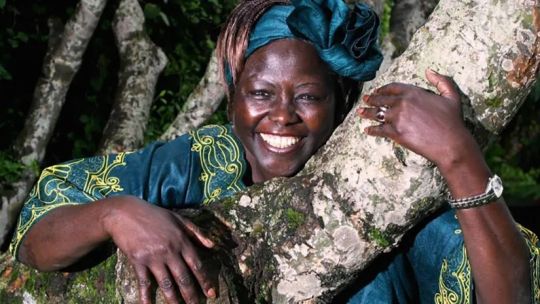

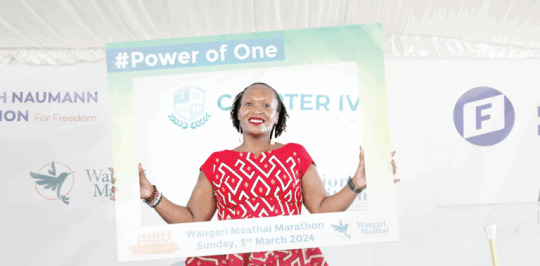

#marathon#wangari maathai#nobel laureate#professor#leader#founder#politician#member of parliament#rest in peace
0 notes
Note
Does nature make u think of god?
yes! eco-theology is a central ribbon of my work and my relationship w god. i care a lot about my relationship w creation
#i think often of wangari maathai saying that salvation rests not only on jesus but on the tree on which he was crucified#ask
3 notes
·
View notes

